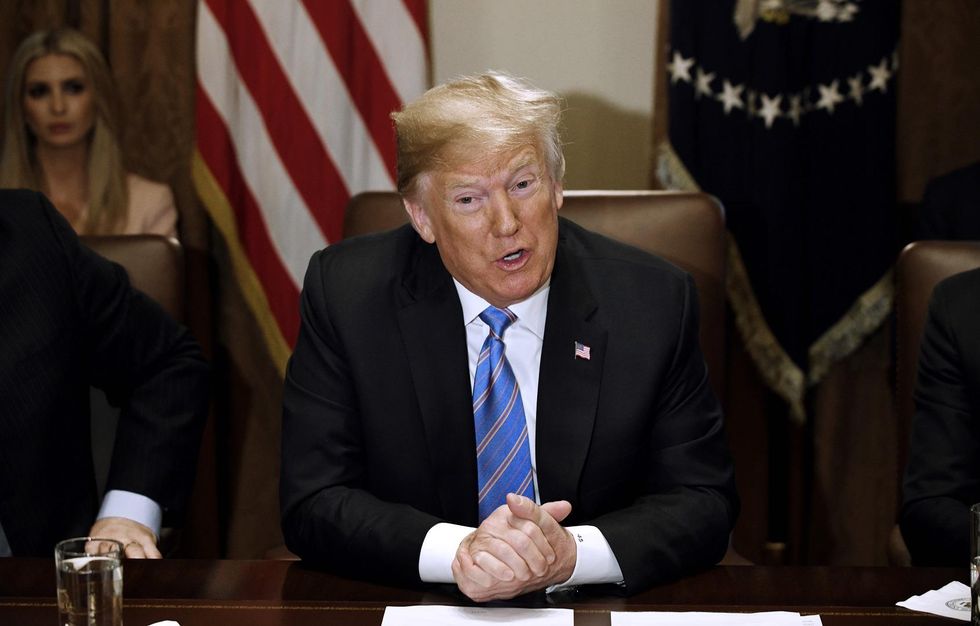EDITOR'S NOTE: Since this story was initially posted, White House Press Secretary Sarah Huckabee Sanders has attempted to clarify President Donald Trump's earlier comments. This story has been updated to reflect that. However, the initial video from Trump's cabinet meeting remains open to some degree of interpretation. You can watch both Trump's statement and Sanders's explanation below to help you try to draw a conclusion of what exactly the president meant.
UPDATE: White House press secretary says Trump wasn't answering 'no' to the question about Russia.
During a White House Press briefing on Wednesday afternoon, Press Secretary Sarah Huckabee Sanders told reporters "after those comments, the president said 'thank you very much,' and was saying 'no' to answering questions. The president and his administration are working very hard to make sure that Russia is unable to meddle in our elections, as they have done in the past as we have stated.
Asked by a member of the press if Russia is still targeting the United States with cyber attacks, President Donald Trump answered simply "no."
This directly contradicts Trump's director of national intelligence, Dan Coats, who said on Friday that when it came to cyber attacks “Russia has been the most aggressive foreign actor, no question.”
What did Dan Coats say?
On Friday, Coats addressed the threat of cyber attacks against the United States. According to Coats, China, Iran, North Korea, and Russia are launching cyber attacks against the U.S. on a daily basis. Furthermore, out of these four countries, he said, “Russia has been the most aggressive foreign actor, no question.”
Coats warned that a “crippling cyber attack on our critical infrastructure” by one of these foreign powers was a distinct possibility.
Coats compared what the intelligence community today was seeing to the “alarming activities” U.S. intelligence noted before the 9/11 attacks. “The system was blinking red. Here we are nearly two decades later and I’m here to say the warning lights are blinking red again,” Coats cautioned.
That same day, Deputy Attorney General Rod Rosenstein announced the indictment of 12 Russians on charges of hacking a state election board website, as well as the Democratic National Committee, the Democratic Congressional Campaign Committee, and the Hillary Clinton Campaign.
What did Trump say?
"Is Russia still targeting the U.S., Mr. President?" A reporter asked offscreen as members of the press were being ushered out of a cabinet meeting at the White House.
"Thank you very much, no," he responded.
"No, you don't believe that to be the case?" the reporter followed up.
"Thank you very much everyone. We're doing very well, we're doing very well. Probably as well as anybody has ever done with Russia. And there's been no president ever as tough as I have been on Russia. All you have to do is look at the numbers, look at what we've done, look at sanctions, look at ambassadors — not there — look, unfortunately, at what happened in Syria recently. And I think president Putin knows that a lot better than anybody, certainly a lot better than the media.
When he mentioned ambassadors, Trump is presumably refering to the 60 Russian diplomats that the U.S. expelled over Russia's refusal to cooperate in the investigation into the attempted assassination of former Russian double agent Sergei Skripal. Former Utah governor John Huntsman is currently serving as ambassador to Russia.
This wouldn't be the first time Trump has publicly contradicted Coats this week
During a press conference with Russian President Vladimir Putin following a joint summit on Monday, Trump said that Coats and other members of his intelligence team had come to him about attempts to meddle in the 2016 presidential election "they said they think it’s Russia," Trump said, before adding "I have President Putin; he just said it’s not Russia. I will say this: I don’t see any reason why it would be."
Trump also that he had “confidence in both parties,” and “I have great confidence in my intelligence people, but President Putin’s denial was strong.”
On Tuesday, however, Trump told reporters that it should have been "obvious" that he had meant to say "wouldn't" instead of "would."
So, just to repeat it, I said the word “would” instead of “wouldn’t,” and the sentence should have been — and I thought it be maybe a little bit unclear on the transcript or unclear on the actual video, the sentence should have been “I don’t see any reason why it wouldn’t be Russia.” Sort of a double negative. So, you can put that in, and I think that probably clarifies things pretty good by itself.




